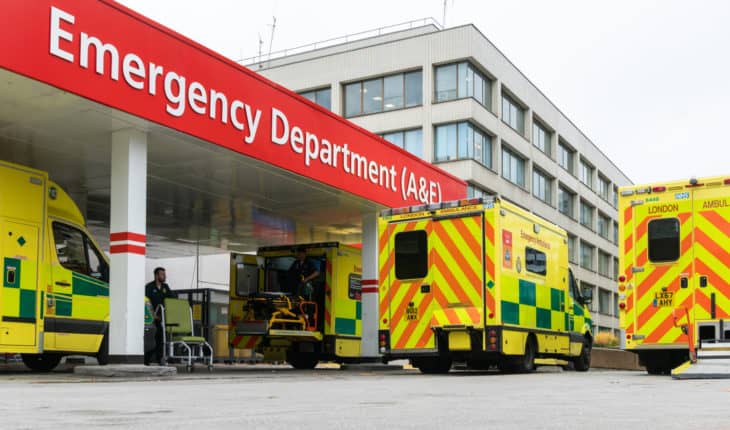A new snapshot survey by the Royal College of Emergency Medicine has found that in August 2021 half of respondents stated that their Emergency Department had been forced to hold patients outside in ambulances every day, compared to just over a quarter in October 2020 and less than one-fifth in March 2020.
The survey, sent out to Emergency Department Clinical Leads across the UK, also found that half of respondents described how their Emergency Department had been forced to provide care for patients in corridors every day, while nearly three-quarters said their department was unable to maintain social distancing every day.
One-third said that the longest patient stay they had had in their Emergency Department was between 24 and 48 hours, with seven per cent reporting the longest stay to be more than 48 hours.
Dr Ian Higginson, Vice President of the Royal College of Emergency Medicine, said:
“It is shocking to see the extent of the challenges faced by Emergency Departments across the UK. Holding ambulances, corridor care, long stays – these are all unconscionable practices that cause harm to patients. But the scale of the pressures right now leaves doctors and nurses no options. We are doing all we can to maintain flow, maximise infection prevention control measures, and maintain social distancing. Our priority is to keep patients safe, and ensure we deliver effective care quickly and efficiently, but it is extremely difficult right now.
“The data is stark, and this is August. Our members are really worried about what may come in autumn and winter. We have a duty to our patients and staff. Currently there is extremely high demand – for a number of reasons – but demand is not the whole picture. Demand presents a challenge because of the limitations of hospital space, workforce shortages, difficulties arranging quick ambulance handovers, smooth care and safe discharge of patients from wards, and a lack of services and alternatives to admission, particularly in the evenings and at weekends.
“The health service entered the pandemic short of staff, with less beds, and underprepared. Throughout the pandemic these shortages have been felt, but with demand higher than ever before, and with a workforce that is burned out, these shortages are felt more acutely than ever.”
Commenting on the increase in ambulance handover delays, Tracy Nicholls, Chief Executive of the College of Paramedics, said:
“The College of Paramedics’ members also speak passionately about the potential for harm to those patients who, as a consequence of these lengthy ambulance handover delays, can wait an unacceptably long time for help. It is deeply concerning.
“Like the Royal College of Emergency Medicine, we recognise that all partners are working exceptionally hard to manage this situation and current demand. The reality is, however, that unless effective actions are taken now to ease the system pressures, more and more patients will face these delays as we head into another difficult winter, and both paramedics and ambulance clinicians across the UK will face the brunt of any further increase in demand.
“We urge NHS leadership to take action now to mitigate this risk wherever possible and protect both patients and our collective workforce from the inevitable pressure that we face if nothing is done.”
The survey also found that over 80% of respondents had little or no confidence in their organisation’s ability to safely and effectively manage the current or predicted combination of pressures as we head into winter.
Dr Higginson continued:
“The final response that found an overwhelming lack of confidence signals something deeply troubling. The College has consistently warned of the upcoming winter and ongoing pressures. It is time we saw leadership and an equivalent response. There must be a comprehensive plan for the current demand and upcoming winter that include short- and long-term solutions to tackle these serious challenges. If ambulance services and Emergency Departments cannot cope with ongoing pressures, then it is patients and the workforce looking after them who will suffer. The winter could lead the health service into a serious crisis. Patients and staff must have assurance that they, their Emergency Department and their hospital will get what they need to manage.”
- Gut microbiome could delay onset of type 1 diabetes - 3rd April 2025
- The da Vinci 5 Robot Is Set To Transform Bariatric Care: - 31st March 2025
- Beyond money: the hidden drivers fuelling child food insecurity - 31st March 2025






